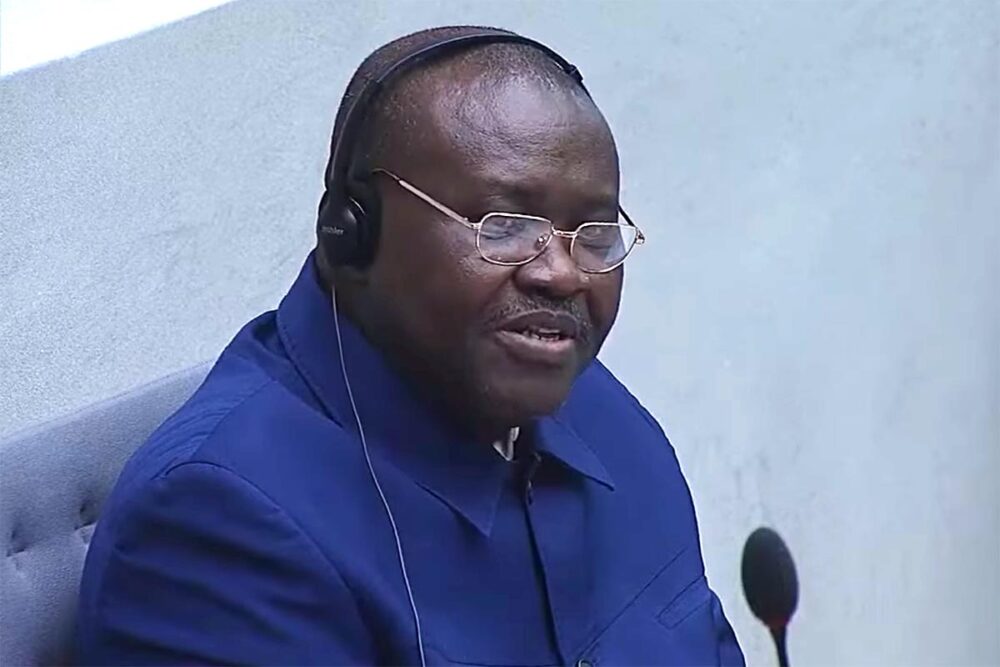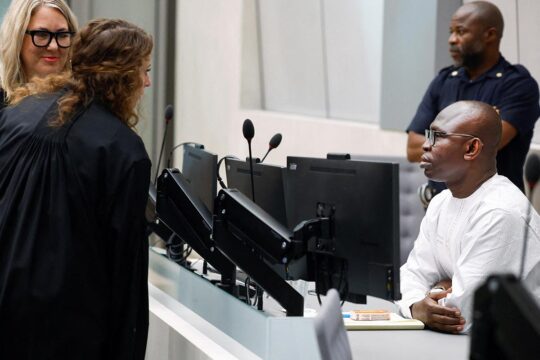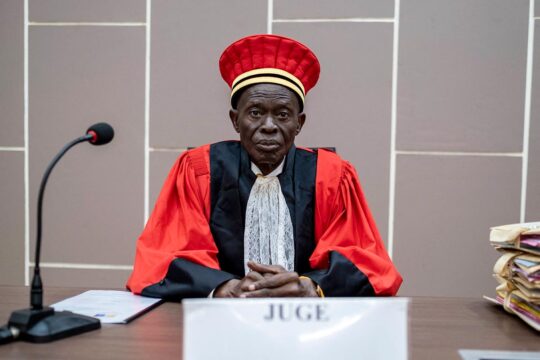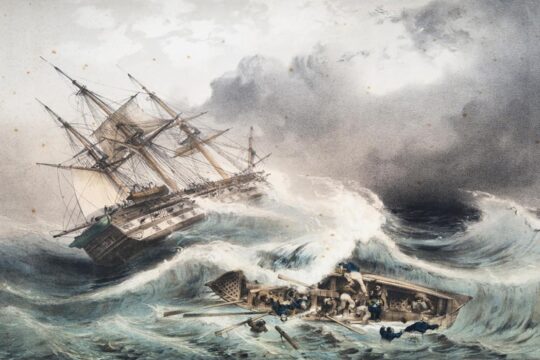Not every defendant at the International Criminal Court (ICC) uses the opportunity to address the court even though they all have that right. In the joint trial of two defendants from the Central African Republic (CAR), one, Patrice-Edouard Ngaïssona, has spent two days this week laying out his version of a chaotic political history and denying that he was responsible in any way for the murder and torture of Muslim civilians and recruiting child soldiers during the country’s ongoing civil war.
There was a full defence team bench behind Ngaïssona, including his main advocate Gert Jan Knoops, for his unsworn testimony to the court. This was the last chance for Ngaïssona to convince the judges of his innocence as he faces 16 counts of war crimes and 16 counts of crimes against humanity for allegedly using his position as the country’s minister of Youth, Sports, Art and Culture in February-March 2013 to recruit child soldiers and incite hatred against Muslims. All the evidence has been heard, and apart from closing statements in December, the judgment - along with any sentence - is due to be issued in 2025.
This is a “great opportunity,” says Michelle Coleman, a lecturer of law at Swansea University, UK, to tell their side without interruption. The defendant may also use it “to try to connect with the court” and “remind the judges that they are people.”
A successful sportsman
At the opening of the trial, the prosecution had alleged that Ngaïssona was part of the “inner circle”, who plotted from abroad to restore former president Francois Bozize to power and topple the rebel Seleka group who had taken over Bangui, CAR’s capital city. But Ngaïssona strenuously denied that he was part of any such circle and said he “never received one single penny” from Bozize. “I do not have his email,” Ngaïssona told the court. “Why would he use a civilian like me?”
Earlier in the trial, prosecutor Vanderpuye had told the court that Ngaïssona had “sent instructions for weapons purchase and attacks.” Absurd, responded the accused, asking for dates, times, amounts, and vehicles. “I know nothing about weapons and weaponry.”
In his opening statement Knoops had presented his client as a civilian whose life was “dominated by his football career” and whose popularity was due to professionalism. CAR had risen through the International Federation of Association Football (FIFA) ranks under Ngaïssona’s care, going from low-ranking 204 out of 207, up to number 50. “This is the reason why people liked him,” Knoops said. Ngaïssona portrayed his busy life as a sports administrator with a role in FIFA as head of the African Football Federation (CAF), with trips to Vancouver and Japan, wielding his diplomatic passport. He also described the set-up in his personal office and said no person who had actually been there failed to comment on the size of his TV screen. That, he said, proved some witnesses were lying about meetings with him.
A youth man
Ngaïssona agreed with the depiction of his influence over CAR’s youth and explained the anti-Balaka – a militia fighting the Muslim dominated Seleka – had come to him. But he played down any role he may have had in connection with violence. The moneys he distributed, he said, were on behalf of other political figures, for coffee, peace rallies, and trucks to get the leadership to places where they could convince young people to be calm.
“I ask the prosecutor to tell you what sum of money I provided to resistance, to whom did I give this money specifically, and by what means did I provide this money. Where are the invoices for the weapons I am supposed to have bought? Where are the numbers of the weapons and munitions that I purchased? Is there but a single arms trader that has stood witness to say Ngaïssona bought weapons or munitions from them? The answer is an obvious no. I was never involved in any arms trading or any arms trafficking. I find it absurd because I know nothing about weapons and weaponry.”
Much of his account was of a man – apart from his sports work – who knew and was known in the political classes, who set up his own political party for the good of the country, but who was falsely named and traduced by opponents. Underlying his account were allegations of big power rivalry over CAR’s oil or mining resources in which the Chinese, the French and the Russian mercenary Wagner group were vying for control and using different politicians against each other. People could be bought and sold, he said. He was one of the only honest brokers in this scenario, telling the truth to all, especially the youth.
Carrying the can for others
Ngaïssona provided the court with a detailed picture of political developments during the messy period of the Seleka attack in 2013-2014, his time in Cameroon and during the 2014-2015 transitional government. Maxine Mokom, the former leader of the anti-Balaka – whose charges were dropped by the ICC prosecutor less than a year ago – was mentioned. The prosecution had argued that Mokom coordinated attacks by anti-Balaka forces against the Muslim population in 2013 and 2014. He was facing 20 counts for murder, rape, pillaging and destruction of buildings, as “no mere bystander”, but rather someone who “must have known” that atrocities were being committed. But that evidence “crumbled,” according to the deputy prosecutor; key insider witnesses apparently were no longer available; the whole case was withdrawn.
That leaves Ngaïssona carrying the can for a much wider group of individuals who were alleged to be part of the inner circle pushing for Bozize’s return to power. The prosecutor is “wilfully turning a blind eye to those who are really responsible for the repeated crises in the CAR,” Ngaïssona told the court. Whether the prosecution has brought a clear analysis in the trial of Ngaïssona on who played which role, how that relates to the modes of liability and therefore who bears which responsibility is difficult to tell, as many of the key testimonies were held behind closed doors.
“One of the risks of an unsworn statement” warns Coleman “is that the defendant could help the prosecution even inadvertently prove the case against them.” That risk may be higher when there are joint defendants as in the Ngaïssona case which is tied to that against Alfred Yekatom, a former caporal chef of the Central African army. But all that seems to link these two men are the crimes committed on the ground by anti-Balaka forces.
What value as evidence?
Ngaïssona related how it felt to hear the accounts of massacres by Seleka, the fear that ran through Bangui as they got closer in 2013, and how he managed to flee with some of his family on motorbikes through the forests into Cameroon.
The prosecution has tried to show that Ngaïssona was a big boss and in charge of the anti-Balaka. But the accused portrayed them as nowhere nearly organised enough to be a ‘militia’, saying rather they were local resistance fighters. “Without denying the crimes committed,” he said, he justified their resistance as the “right to defend themselves” and professed admiration for Ukraine’s stance against Russian aggression. He said he advised young people on the need for peace and co-existence. “I told them that the bullets that come out of barrels of guns do not try to find out who your parents are.”
As for hate speech, Ngaïssona repudiated any idea that he was anti-Muslim, pointing to those who worked for him or were helped by him, and others with whom he has good social relations. “It is not in my DNA,” he stated. He was “flabbergasted” by Facebook postings attributing statements to him. “In what way am I responsible for their thoughts?” he asked.
This case is the second the ICC has tackled in the Central African Republic – apart from the Mokom fiasco. The first was against Jean-Pierre Bemba, a former vice-president and warlord from neighbouring Democratic Republic of Congo, who was acquitted of his responsibility as the chief commander of a Congolese militia which had entered CAR in 2012 raping and murdering civilians in Bangui.
How will the judges weigh Ngaïssona’s evidence? “We have no kind of real example of them taking unsworn statements as serious evidence that is helping to prove or disprove the crimes,” says Coleman. “But on the other hand, we don't have a lot of evidence that they're not taking them into account either. So, it's really up to the judges how seriously they take them.”








